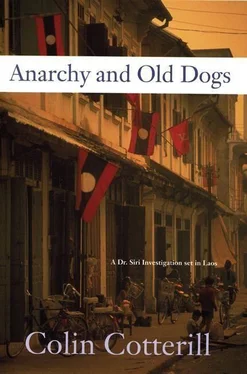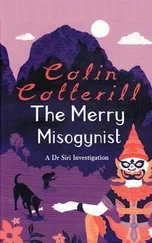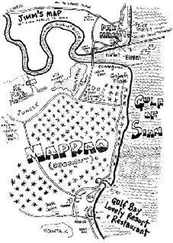Colin Cotterill - Anarchy and the Old Dogs
Здесь есть возможность читать онлайн «Colin Cotterill - Anarchy and the Old Dogs» весь текст электронной книги совершенно бесплатно (целиком полную версию без сокращений). В некоторых случаях можно слушать аудио, скачать через торрент в формате fb2 и присутствует краткое содержание. Жанр: Криминальный детектив, на английском языке. Описание произведения, (предисловие) а так же отзывы посетителей доступны на портале библиотеки ЛибКат.
- Название:Anarchy and the Old Dogs
- Автор:
- Жанр:
- Год:неизвестен
- ISBN:нет данных
- Рейтинг книги:3 / 5. Голосов: 1
-
Избранное:Добавить в избранное
- Отзывы:
-
Ваша оценка:
- 60
- 1
- 2
- 3
- 4
- 5
Anarchy and the Old Dogs: краткое содержание, описание и аннотация
Предлагаем к чтению аннотацию, описание, краткое содержание или предисловие (зависит от того, что написал сам автор книги «Anarchy and the Old Dogs»). Если вы не нашли необходимую информацию о книге — напишите в комментариях, мы постараемся отыскать её.
Anarchy and the Old Dogs — читать онлайн бесплатно полную книгу (весь текст) целиком
Ниже представлен текст книги, разбитый по страницам. Система сохранения места последней прочитанной страницы, позволяет с удобством читать онлайн бесплатно книгу «Anarchy and the Old Dogs», без необходимости каждый раз заново искать на чём Вы остановились. Поставьте закладку, и сможете в любой момент перейти на страницу, на которой закончили чтение.
Интервал:
Закладка:
He slammed his drink down on the flimsy plywood coffee table and his glass cracked neatly into two parts: a napkin ring and a small petri dish. The whisky splashed in all directions. Blood oozed from his finger.
“Shit.” He looked at the mess and started to laugh. “Is there a doctor in the hotel?”
“Whisky’s an antiseptic,” Siri said. “It’ll fix itself.”
“Not if I bleed to death.”
Civilai clenched his fist and walked, laughing, to the bathroom. He emerged wrapping toilet tissue around a wound from which angry blood flowed eloquently. “They called us the lotus-eaters,” he went on, even before reclaiming his seat. “Did you know that? The lotus bloody eaters. When did you last eat lotus?”
“Hmm, let me think,” said Siri, observing the distorted Nordic stag through his glass. “It’s been a while. However, I did have several dandelions for breakfast this morning.”
“Just how condescending could they be?” Civilai had arrived at a stage where Siri was irrelevant. “Lotus-eaters! How would they feel if we called them snail-eaters?”
“I’ve called them worse than-”
“And there were the damned Royalists fighting with them against our people. How on earth could they?”
Civilai was sitting on the edge of the bed now. He had a wad of paper tissue the size of Singapore around his finger. He held the empty cardboard roll proudly in his uninjured hand. Siri was impressed by his friend’s emergency first aid.
“Well, you have to admit,” Siri said, “the Royal Lao Army weren’t the most fearsome of foes.”
Civilai smiled. “The president used to say the RLA rarely put fear in the heart of the enemy, but they frightened the living daylights out of their own commanders.”
The two old communists laughed at this lore as they had hundreds of times before. Siri had one of his own.
“I seem to remember,” he said, “that their few pilots used to drop their bombs in the rivers, miles from the targets, so they wouldn’t have to go near the anti-aircraft guns. There was always a bumper harvest of prefried fish for the locals.”
The mood lightened and laughter became more prevalent as they recalled their favorite RIA stories. Civilai drank his whisky from an old teacup until there was no more whisky to be had. There was no third act. This drunken political flashback had drained them both of memories and sense. Siri meandered to the door.
“I am for bed.”
“Don’t forget to say your prayers.”
“Prayers? In a country with no religion and no money, it’s hard to know what to pray for anymore.”
There had been a fine, of course. Officially, any Thai government employee coming across illegal Lao immigrants on Thai soil was obliged to ship them off to one of the camps. But where was the profit in that? A healthy brokerage business had mushroomed along the border. It helped that the Thai junta of the month refused to recognize the people fleeing Laos as refugees. It called them “temporary visitors” and, as such, they were expected to meet the legal immigration requirements. Those without visas (all of them) were subject to fines. If they could pay up, they were escorted to the camps. If they were too poor to pay, their names would be forwarded to a camp and posted on a board. Family and friends would then be expected to scratch around for enough money to cover the police fine. Those with neither money nor friends were of no use to anybody. They were invariably encouraged to escape police custody and find their own ways to the nearest camp.
Phosy and Dtui spent just one night in the police lockup at Bok. They were able to pay for their release with a small gold bracelet Dtui carried with her. It looked a lot more valuable than it actually was. They were dispatched the following day to Ban Suan Lao, a sprawling refugee camp in the northern outskirts of Ubon. It was Dtui’s first trip out of her own country and, despite the gravity of their mission, she looked out through the wooden slats of the open-air truck like a child on vacation. They passed directly through the center of the city and, even though Thailand was just a more affluent version of Laos, she marveled at the exotic shop signs and the variety of goods on display. She looked at the busy traffic, the foreign cars, the nice clothes worn by the girls who walked along the paved footpaths. Food was for sale everywhere, the scents briefly catching a ride on the truck: frying chicken, freshly baked cakes, sliced fruit on handcarts, strawberry syrup on shaved ice. There was a different feel and pace about Thailand that she instantly fell in love with.
Phosy sat across from her and could see the wonder reflected in her eyes. She didn’t seem to feel the danger of what they were doing. To her it was like some holiday trip. It was as if only he knew how much could go wrong, how many perils they faced. More and more he regretted her presence here, doubting his own ability to protect her. She was a distraction and he resented her for coming.
The truck arrived at an open gate manned by two unarmed military guards. It wasn’t what Phosy and Dtui had expected. Their imaginations were full of Nazi prisoner-of-war camps from the movies. They’d expected high mesh fences topped with barbed wire, machine-gun turrets, and spotlights. Instead, people strolled in and out through the open gate, pushing carts and wheeling bicycles. The perimeter fence was made of bamboo: one huff and puff and it would have tumbled.
One guard signed the driver’s clipboard chit and told the new arrivals to go and register at a large open hut a short walk along the driveway. There were twelve of them in this consignment: three couples with children, Dtui and Phosy without. They’d exchanged nods on the truck and asked a few fundamental questions, but none of them were prepared to share intimate details with strangers. Suddenly everyone was suspicious. They walked in silence now along the paved road, anxious and apprehensive. They’d been separated from their world, from the devil they knew. Even Dtui and Phosy felt it, that sensation of reaching a point of no return, that the next document they signed would be a contract for their souls.
The First Sneaky Malevolent Spirit Attack
As many counterrevolutionaries would have you know, when in the midst of diverting a national crisis, there’s always a case for taking a little time off for tourism. So it was that Siri and Civilai, heads heavy from a serious whisky night, found themselves in possession of a sturdy black Willys jeep for the day. It belonged to the old postmaster. Daeng had somehow talked him into parting with it. Siri had somehow talked Civilai into joining him and assigned him the role of driver.
“I’m not at all sure we should be doing this,” Civilai said, “given that-”
“Oh, shut up,” Siri shouted above the growl of the engine. “What else would we be doing? Sitting around waiting for information to drop into our laps? We’ve got good people on our side doing all the legwork. What difference is one day going to make? Let’s just think of ourselves as the command center. You’re the commander in chief and I’m the commander’s travel agent, responsible for his psychological well-being.”
“Of course, I hadn’t thought of it like that.”
Before reaching the end of the first street, they dropped into a pothole deep enough to bury a buffalo. Siri reached for his stomach. “Damn it.”
Civilai stamped on the brake. “You going to be sick?”
“Worse than that.” Siri reached for the hem of his shirt and caught the white amulet as it dropped to his lap. The platted hair that formed its string had always looked frayed, and finally it had snapped.
“This isn’t going to cast us into eternal damnation, is it?” Civilai asked.
Читать дальшеИнтервал:
Закладка:
Похожие книги на «Anarchy and the Old Dogs»
Представляем Вашему вниманию похожие книги на «Anarchy and the Old Dogs» списком для выбора. Мы отобрали схожую по названию и смыслу литературу в надежде предоставить читателям больше вариантов отыскать новые, интересные, ещё непрочитанные произведения.
Обсуждение, отзывы о книге «Anarchy and the Old Dogs» и просто собственные мнения читателей. Оставьте ваши комментарии, напишите, что Вы думаете о произведении, его смысле или главных героях. Укажите что конкретно понравилось, а что нет, и почему Вы так считаете.












